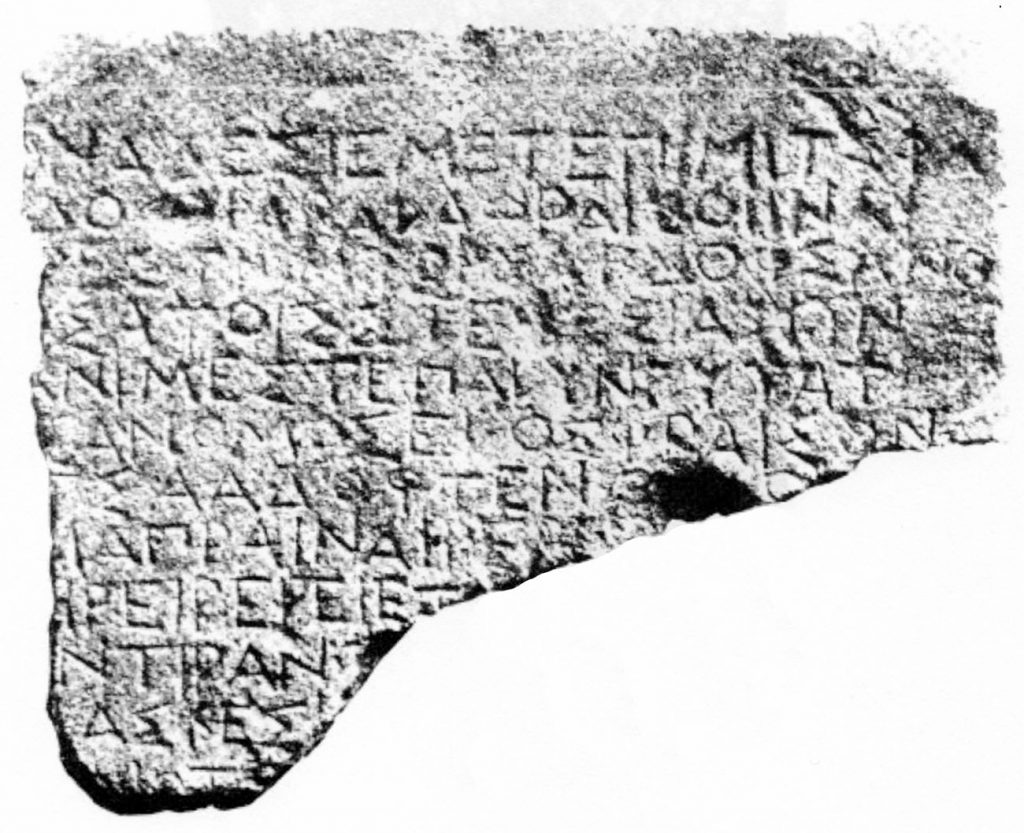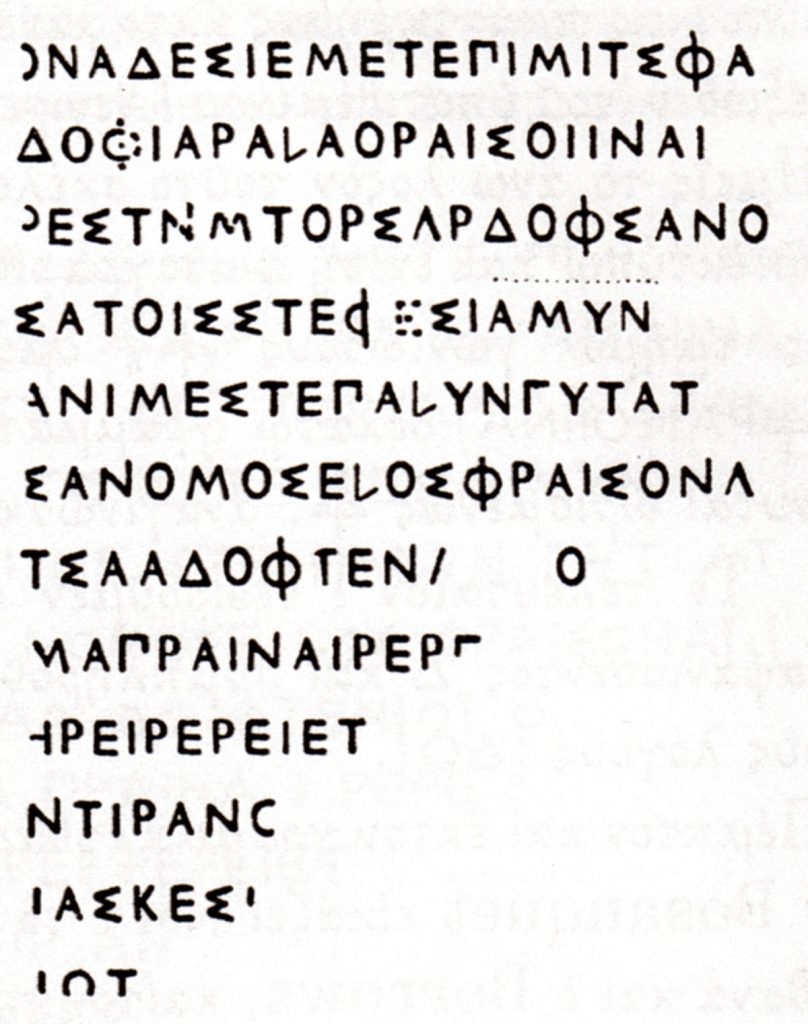Fraison Legislates
Fraison’s Law
The Law of Land Distribution
The inscription was found in Praisos acropolis in June 1901, by the British Archaeologist R. C. Bosanguet, among the ruins of a wall of the sanctuary, in the northern entrance of Praisos on Crete, Greece.
It dates back to the years after 400 B.C..
The inscribed stone, as it is depicted in Iakovos Thomopoulos’ book Pelasgika (Πελασγικά).

Identification and clear writing of the text, which is inscribed on the stone.

This is an accurate copy of the clearly written text of the stone, as this is found on page 83 of Iakovos Thomopoulos’ book Pelasgika (Πελασγικά).
The text is about the Law of Land Concession.
It is an evidence of justice and law of that period of time.
We studied the phonetic values in the actual text. We understood it, we read and rendered it into Modern Greek, but we also approached it philosophically.
Figuration of the phonetic values of the text.
In our own view, the phonetic values are formed as follows:
ΟΝ ΑΔ ΕΣΙΕ ΜΕΤΕ ΠΙΜ ΙΤ ΣΦΑ
ΔΟΘΙ ΑΡΑΛΑ ΟΡΑΟΙΣΟΙ. ΙΝΑΙ
ΡΕΣΤ ΝΜ. ΤΟΡ Σ ΑΡΔΟΦΣΑΝΟ (ΑΡΔΟ ΦΣ ΑΝΟ)
Σ’ ΑΤΟ ΙΣΣΤΕ. ΦΕΣΙΑ ΜΥΝ
ΑΝΙ ΜΕΣΤΕ ΠΑΛΥΝ ΓΥΤ ΑΤΣΑ;
ΝΟΜΟ ΣΕΛΟΣ ΦΡΑΙΣΟΝ
ΑΤΣΑ ΑΔΟ ΦΤΕΝ(Α) (Π)Ο(ΛΛΑ) – – – – – –
ΜΑ ΠΡΕΝ ΑΙΡΕΡΕ(Τ) – – – – – –
(Η)Ρ ΕΙΡΕ ΡΕΙΕ Τ – – – – – –
(Ε)ΝΤΙΡΑΝΟ – – – – – –
Ι ΑΣΚΕΣ(Ι) – – – – – – – –
ΙΟΤ(Η) – – – – – – – – – – –
The language of the text is Greek, Archaic, typical of any Doric text. The grammatical structure of the text is mixed.
One can identify Pontic, Macedonian and Doric words, as well as Classical Greek Language.
The utterance of the words and of the verbal types, follows the grammatical rules of the Pontic and Doric Dialects, as well as those of the Classical Greek Language.
Rendition of the text:
Ατόν αδά, ε®ιέν μετέασι ποιμένουσι ήτοι, σφάς(σ’ αυτούνους) δώθαν άραλα οράοισι.
Είναι ρέστα νομής.
Τορεύ συ αρτεσιανόν σ’ ατό ισστεύ.
Φέ®ια μύνην ανήν μεστήν πάλιν.
Γύτ’ ατ®ειά;
Νόμον ο Σελλός Φραίσον (έστεσεν);
Ατ®ειά αδά φτενά πολλά μα(ναι) με το πραίν αϊρερεϊτίζνε – – – – –
Ήρ είρε ρείε τ- – – – – – —
Εντηράνω – – – – – – – – –
Ι ασκέσι – – – – – – – – –
Ιότη – – – – – – —
The Text in Modern Greek:
And he, who owes assets to those (to the fighters) who took care of him, the only thing he gave them was moors on the mountains.
They are a surplus for distribution.
He waters them from the well and he wins.
For the things he did not give to the fighters, he says theories that do not make sense, trying to justify himself.
Will he expel him?
Τhey cut with a saw cheaply here.
Fraison rules that you throw the cut trees into the river, to acquire two aspects.
Will.
(Και αυτόν εδώ, που περιουσιακά στοιχεία αξίωνε από αυτούς που τον φρόντιζαν, δηλαδή, σε αυτούς(τους μαχητές) ανάλογα με αυτά που τους άνηκαν, δόθηκαν χερσότοποι ορεινοί.
Είναι υπολειπόμενα για μοίρασμα.
Για αυτά που δεν απέδωσε όλο προφάσεις που δεν στέκουν, αναπτύσσει πλήρως ως θεωρίες για άλλημία φορά.
Θα τον διώξει άραγε;
Νόμο(φραγμό-διαταγή) έβαλε ο Σελλός Φραίσων
Άραγε, εδώ φτηνά πολύ ναι με το πριόνι πριονίζουν – – – – – – – –
Την άνοιξη εν σειρά ρίξε (στον ποταμό τα πριονισμένα δέντρα) – – – – – – – –
Δυό όψεις (να αποκτίσουν) – – – – – – – – – –
τα ακατέργαστα προς κατεργασία – – – – – – – – – –
θέληση, βούληση – – – – – – — – –)
A Philosophical Approach:
Τ.Ο R.M. Borrows, Conway, and the Greek Iakovos Thomopoulos dealt with this text.
I thoroughly studied all the projects Thomopoulos carried out, as well as his effort to approach the ancestral texts through Arvanitika (the Dialect Arvanites spoke), and I realized that it is a branch of the Greek Language.
In this text, a legislator named Fraison, who is also called Sellos, establishes laws.
He distributes land to those who deserve it.
In the past, honour used to be attributed to those who fought with bravery in wars and won. This honour included land for farming.
Among the beneficiaries there is a person, maybe an aide, who is privileged.
He was also granted land.
Ηis land is about watering.
He irrigates his crop and he earns income.
However, he does not pay his taxes, that is why he says theories that do not make sense, trying to justify himself.
For this reason Fraison legislates.
The law is for the people who do not pay their taxes to the State, and who cut wood in the distributed land.
The trunks are maybe cut during the winter and, as they are raw, they are thrown in the river for processing.
After reading the text, we understand that:
Inscriptions serves writing and the language is Greek.
The society is governed by rules, which are often reviewed and adjusted, according to the special occasions.
The Arts and the techniques, prove their socio-cultural level.
Τhe technique of clearing the land under a rational concept.
The land is farmed and irrigated, so the people know how to use the underground water.
Wood-cutting smartly, for easy carriage through the river, which facilitates wood-cutters’ work from the past to the present.
The rest of the text, which is missing, would help us to fully render the ideas evoked in it. That is why the reading and interpretation of it stop at this point, where the text is sustained and meaningful.
